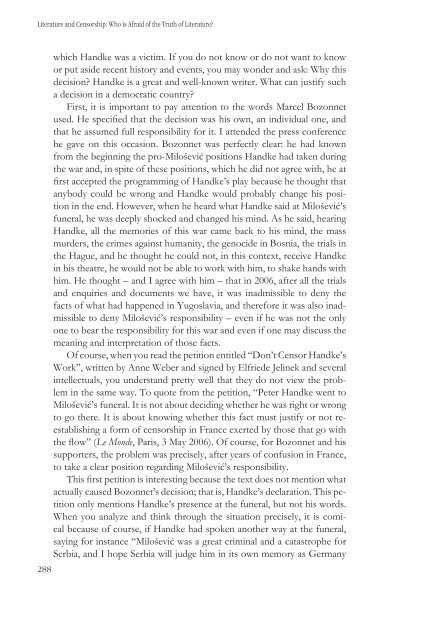Literatura in cenzura - Društvo za primerjalno književnost - ZRC SAZU
Literatura in cenzura - Društvo za primerjalno književnost - ZRC SAZU
Literatura in cenzura - Društvo za primerjalno književnost - ZRC SAZU
- No tags were found...
Create successful ePaper yourself
Turn your PDF publications into a flip-book with our unique Google optimized e-Paper software.
Literature and Censorship: Who is Afraid of the Truth of Literature?288which Handke was a victim. If you do not know or do not want to knowor put aside recent history and events, you may wonder and ask: Why thisdecision? Handke is a great and well-known writer. What can justify sucha decision <strong>in</strong> a democratic country?First, it is important to pay attention to the words Marcel Bozonnetused. He specified that the decision was his own, an <strong>in</strong>dividual one, andthat he assumed full responsibility for it. I attended the press conferencehe gave on this occasion. Bozonnet was perfectly clear: he had knownfrom the beg<strong>in</strong>n<strong>in</strong>g the pro-Milošević positions Handke had taken dur<strong>in</strong>gthe war and, <strong>in</strong> spite of these positions, which he did not agree with, he atfirst accepted the programm<strong>in</strong>g of Handke’s play because he thought thatanybody could be wrong and Handke would probably change his position<strong>in</strong> the end. However, when he heard what Handke said at Milošević’sfuneral, he was deeply shocked and changed his m<strong>in</strong>d. As he said, hear<strong>in</strong>gHandke, all the memories of this war came back to his m<strong>in</strong>d, the massmurders, the crimes aga<strong>in</strong>st humanity, the genocide <strong>in</strong> Bosnia, the trials <strong>in</strong>the Hague, and he thought he could not, <strong>in</strong> this context, receive Handke<strong>in</strong> his theatre, he would not be able to work with him, to shake hands withhim. He thought – and I agree with him – that <strong>in</strong> 2006, after all the trialsand enquiries and documents we have, it was <strong>in</strong>admissible to deny thefacts of what had happened <strong>in</strong> Yugoslavia, and therefore it was also <strong>in</strong>admissibleto deny Milošević’s responsibility – even if he was not the onlyone to bear the responsibility for this war and even if one may discuss themean<strong>in</strong>g and <strong>in</strong>terpretation of those facts.Of course, when you read the petition entitled “Don’t Censor Handke’sWork”, written by Anne Weber and signed by Elfriede Jel<strong>in</strong>ek and several<strong>in</strong>tellectuals, you understand pretty well that they do not view the problem<strong>in</strong> the same way. To quote from the petition, “Peter Handke went toMilošević’s funeral. It is not about decid<strong>in</strong>g whether he was right or wrongto go there. It is about know<strong>in</strong>g whether this fact must justify or not reestablish<strong>in</strong>ga form of censorship <strong>in</strong> France exerted by those that go withthe flow” (Le Monde, Paris, 3 May 2006). Of course, for Bozonnet and hissupporters, the problem was precisely, after years of confusion <strong>in</strong> France,to take a clear position regard<strong>in</strong>g Milošević’s responsibility.This first petition is <strong>in</strong>terest<strong>in</strong>g because the text does not mention whatactually caused Bozonnet’s decision; that is, Handke’s declaration. This petitiononly mentions Handke’s presence at the funeral, but not his words.When you analyze and th<strong>in</strong>k through the situation precisely, it is comicalbecause of course, if Handke had spoken another way at the funeral,say<strong>in</strong>g for <strong>in</strong>stance “Milošević was a great crim<strong>in</strong>al and a catastrophe forSerbia, and I hope Serbia will judge him <strong>in</strong> its own memory as Germany
















